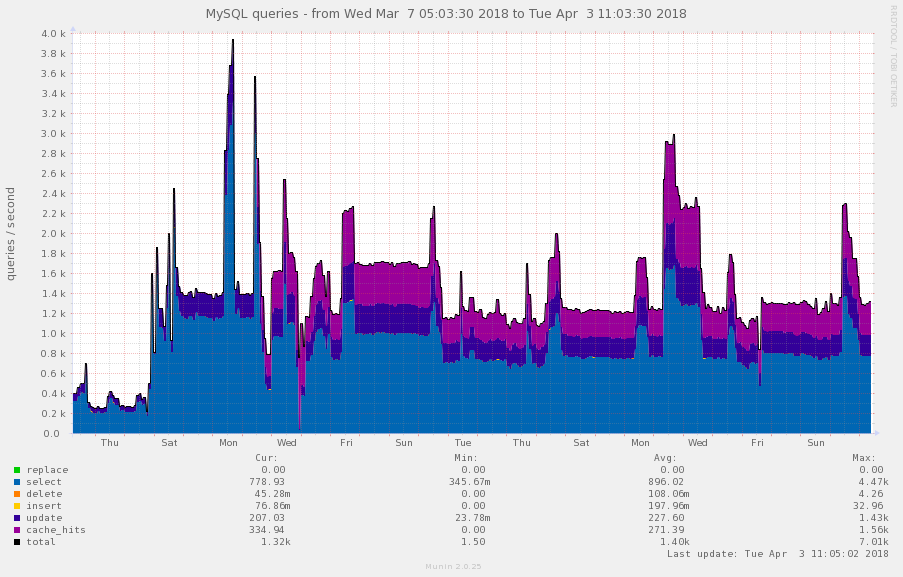Nextcloud version (eg, 12.0.2): 13.0.0
Operating system and version (eg, Ubuntu 17.04): Ubuntu 16.04.04 LTS
Apache or nginx version (eg, Apache 2.4.25): Apache 2.4.18-2
PHP version (eg, 7.1): 7.0.25
The issue you are facing:
Since I updated from NC 11 to NC 13 I can see a massive increase of mysql queries on the server, which lead to an increase of the server’s load.
Running NC 11 there were 400 queries per second. Now with Nextcloud 13 there are more than 1700 queries per second. There are no error messages in the log and also the apache log does not show any errors.
Are there any major changes in database handling since version 11 which could be responsible for this behavior?
Is this the first time you’ve seen this error? (Y/N): Y
The output of your config.php file in /path/to/nextcloud (make sure you remove any identifiable information!):
<?php
$CONFIG = array (
'instanceid' => 'abcdefg',
'passwordsalt' => '',
'secret' => '',
'trusted_domains' =>
array (
0 => 'XXX.XX',
4 => '*.xxx.xx',
),
'datadirectory' => '/data/cloud/data',
'overwrite.cli.url' => 'https://xxx.xx',
'dbtype' => 'mysql',
'version' => '13.0.0.14',
'dbname' => 'nextcloud',
'dbhost' => 'localhost',
'dbport' => '',
'dbtableprefix' => 'oc_',
'dbuser' => 'user',
'dbpassword' => 'XXXXXXXXXXX',
'default_language' => 'de_DE',
'installed' => true,
'loglevel' => 1,
'logdateformat' => 'F d, Y H:i:s',
'log_rotate_size' => 104857600,
'mail_from_address' => 'admin',
'mail_smtpmode' => 'sendmail',
'mail_domain' => 'mail.domain',
'preview_libreoffice_path' => '/usr/bin/libreoffice',
'appstore.experimental.enabled' => true,
'maintenance' => false,
'skeletondirectory' => '',
'theme' => '',
'enable_certificate_management' => true,
'memcache.local' => '\\OC\\Memcache\\APCu',
'memcache.distributed' => '\\OC\\Memcache\\Memcached',
'memcached_servers' =>
array (
0 =>
array (
0 => 'localhost',
1 => 11211,
),
),
'trashbin_retention_obligation' => 'disabled',
'version_retention_obligation' => 'disabled',
'activity_expire_days' => '4748',
'singleuser' => false,
'logtimezone' => 'Europe/Berlin',
);

